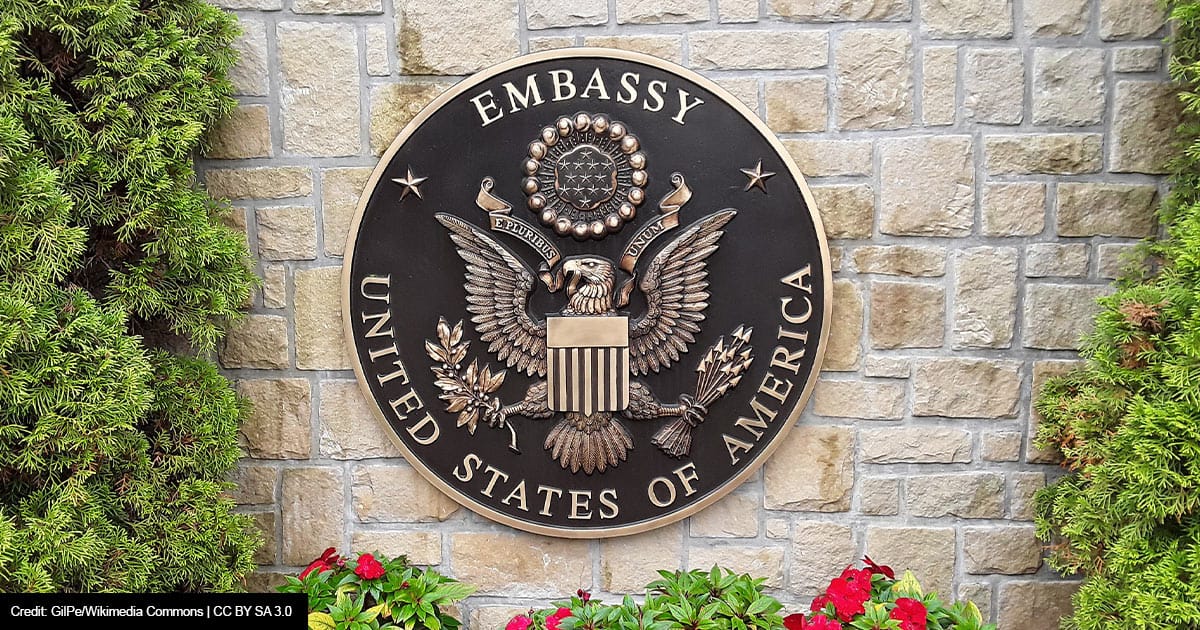
CLICK HERE TO JOIN OUR WHAT’S APP GROUP
BY Joshua Arnold
SOURCE, WASHONTGON STAND: The U.S. State Department is formulating plans to close 10 embassies and 17 consulates, reported The New York Times, based upon an internal memo.
The plan, which expands on one circulated in an earlier March memo, is part of an internal budget-cutting campaign, which aims to reduce the State Department operations budget by as much as 20%.
The memo proposed shuttering six embassies in Africa (Central African Republic [C.A.R.], Eritrea, Gambia, Lesotho, the Republic of Congo and South Sudan), two in Europe (Luxembourg and Malta), one in the Caribbean (Grenada), and one in the Indian Ocean (the Maldives), according to the Times. However, the official State Department list of embassies does not list a U.S. embassy in Grenada.
The memo also proposed closing all five U.S. consulates in France, two out of five U.S. consulates in Germany, and both branch offices of the embassy in Bosnia and Herzegovina, the Times said.
It also proposed closing the consulates in Thessaloniki, Greece; Florence, Italy; Ponta Delgada, Portugal; and Edinburgh, Scotland, plus four outside of Europe: Douala, Cameroon; Medan, Indonesia; Durban, South Africa; and Busan, South Korea.
The U.S. operated 271 diplomatic missions overseas (embassies and consulates) in 2023, according to the Lowy Institute’s Global Diplomacy Index. These proposals therefore represent a 10% cut to the number of U.S. missions.

The Times complained that closing embassies “would hinder the work of large parts of the federal government,” especially the Central Intelligence Agency (CIA), which usually posts its officers at embassies under a diplomatic cover.
“Embassies house officers from the military, intelligence, law enforcement, health, commerce, trade, treasury and other agencies,” they explained.
They especially fretted over “ceding vital diplomatic space to China,” which according to the Lowy Institute operates 274 overseas missions.
But diplomatic influence cannot be measured simply by counting the number of foreign missions a nation operates.
There are many important factors, including how a nation uses the diplomatic missions it has. (In that respect, the U.S. is never going to leverage its overseas missions as far as China, which has operated secret police stations even inside the U.S. to keep tabs on its own citizens.)
The point is, if some U.S. missions see little to no use, or are more of a liability than an asset, then they should be shut down. And suggesting “then we’ll have less than China” is not a good argument for keeping them open.
There are already at least 25 nations without an official U.S. embassy in-country, TWS found.
The U.S. embassies in six nations (Afghanistan, 2021; Belarus, 2022; Sudan, 2023; Syria, 2012; Venezuela, 2019; and Yemen, 2015) have suspended operations entirely due to dangerous conditions persisting there. Meanwhile, the American embassy to Guinea-Bissau is located in neighboring Senegal, the embassy to Libya operates out of Tunisia, and the embassy listed for Iran is really the Swiss embassy.
For 16 other nations, the U.S. has no embassy listed at all. This includes six Caribbean island nations (Antigua and Barbuda, Dominica, Grenada, St. Kitts and Nevis, St. Lucia, and St. Vincent and the Grenadines), which all use the U.S. embassy in Barbados.
It also includes four Pacific island nations (Kiribati, Nauru, Tuvalu, and Vanuatu) and one African island nation (Sao Tome and Principe). Rounding out the list are three tiny European nations (Andorra, Liechtenstein, and Monaco), and two nations with whom the U.S. has no formal relations (Bhutan and North Korea).
The clever reader will likely notice a theme to nations lacking U.S. embassies: most are tiny nations with small populations, small economies, and therefore little business to transact with the U.S. What little business there is can more easily be conducted through an embassy in a neighboring country than by establishing a whole new embassy, requiring infrastructure, staff, vetting procedures, etc.
The embassy closures proposed by the State Department largely continue this theme: Lesotho and Gambia are entirely surrounded by another country, while Luxembourg, Malta, and the Maldives are small (and, for two out of three, also islands).
It’s less obvious why the State Department chose certain consulates to shutter, but it could be for the same reason: little work to do that could not be handled more easily somewhere else.
The most notable embassies to be closed are those in the relatively larger nations of C.A.R., South Sudan, and Republic of Congo.
The first two are landlocked, impoverished nations that have little intercourse with the U.S.; C.A.R. ranks among the world’s most repressive countries, while South Sudan has little infrastructure or civic stability.
The Republic of Congo is better off, but perhaps the State Department noticed that the U.S. operated another embassy only four miles away (as the crow flies), across the river in the Democratic Republic of Congo.
It is also notable that so many proposed consulate closures are in Europe.
This could reflect a downturn in European tourism, likely due to lingering effects of the COVID-19 pandemic, resulting in fewer Americans requiring consular services.
This could also reflect the Trump administration’s wariness about European countries that have retreated from certain fundamental freedoms. “The threat that I worry the most about vis-à-vis Europe is not Russia; it’s not China; it’s not any other external actor,” Vice President J.D. Vance said in February. “What I worry about is the threat from within: the retreat of Europe from some of its most fundamental values, values shared with the United States of America.”
This raises another factor the State Department must consider: the potential threats to U.S. diplomatic missions. The 2012 attack on America’s consulate in Benghazi, Libya, which resulted in four American deaths, dramatically underscores the real risk associated with operating far-flung diplomatic missions in hostile corners of the globe, with only a handful of staff.
So far this year, the State Department has seen an unusually high number of resignations (about 700), including 450 career diplomats. For the safety of America’s own diplomats, it makes sense to consolidate our diplomatic missions, so that America operates no more than it can fully staff.
With staffing cuts and budget cuts, it makes sense for the State Department to trim away the least important overseas missions, too. And, once those reductions are made, a slimmer State Department — and the U.S. taxpayers who fund it — will benefit for years to come.
CLICK HERE TO JOIN OUR WHAT’S APP GROUP
CLICK HERE TO JOIN OUR WHAT’S APP GROUP
CLICK HERE TO JOIN OUR WHAT’S APP GROUP
CLICK HERE TO JOIN OUR WHAT’S APP GROUP
CLICK HERE TO JOIN OUR WHAT’S APP GROUP
Advertise with the mоѕt vіѕіtеd nеwѕ ѕіtе іn Antigua!
We offer fully customizable and flexible digital marketing packages.
Contact us at [email protected]

















there goes the top dog chances of getting one in Antigua
Antigua and Barbuda might have stood a great chance of getting an Embassy years ago but with the recent influence of the Department of Government Efficiency (DOGE) and the tremendous cutbacks that we are now witnessing, it is highly unlikely that the US would expand its Embassy footprint in the Caribbean anytime soon and under this administration.
Bullshit, The Top Dawg will just call Trump and demand we get an Embassy here, just watch and see
Antigua might just get an embassy, after all how can they keep an eye on Antigua.
This trump appears to be very disconcerting , but it may be he is doing a good job in disguise, the onliest thing he won’t do is trouble netanyahu. the embassy are in these countries and Caribbean as a tool to destabilize government by the CIA, the embassy install our prime ministers or who ever stooges they will get to further their hegemony agenda, the alpha Nero is an example, if Gaston was to talk about the embassy official that called to give him instructions, that he became confident that they are friends and thought he will get an embassy in Antigua, or is it another big jackpot for someone on government to build a next embassy building like the specialty constructed on for Mr shoulz that the passport office is I’m up to this day, it seems there is a government agreement that whoever build one is entitled to a 60 years rental agreement to cover the cost require for a special design building according to the USA military specs since now the Antigua government has rented that property into perpetuity. But our leader are little lap dogs to be used by these develop countries.
Comments are closed.